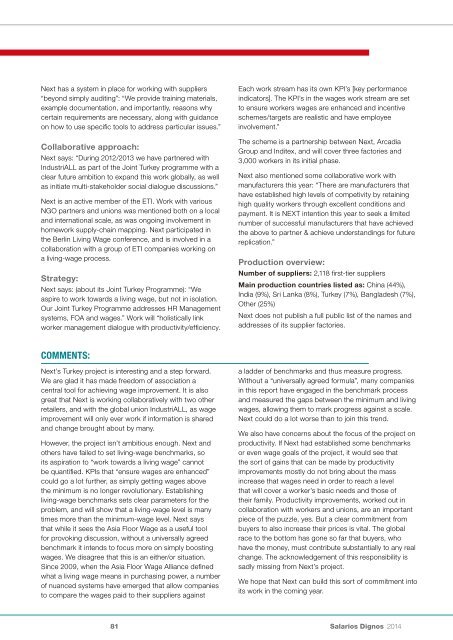17Investigación SALARIOS dignos definitiva
17Investigación SALARIOS dignos definitiva
17Investigación SALARIOS dignos definitiva
You also want an ePaper? Increase the reach of your titles
YUMPU automatically turns print PDFs into web optimized ePapers that Google loves.
Next has a system in place for working with suppliers<br />
“beyond simply auditing”: “We provide training materials,<br />
example documentation, and importantly, reasons why<br />
certain requirements are necessary, along with guidance<br />
on how to use specific tools to address particular issues.”<br />
Collaborative approach:<br />
Next says: “During 2012/2013 we have partnered with<br />
IndustriALL as part of the Joint Turkey programme with a<br />
clear future ambition to expand this work globally, as well<br />
as initiate multi-stakeholder social dialogue discussions.”<br />
Next is an active member of the ETI. Work with various<br />
NGO partners and unions was mentioned both on a local<br />
and international scale, as was ongoing involvement in<br />
homework supply-chain mapping. Next participated in<br />
the Berlin Living Wage conference, and is involved in a<br />
collaboration with a group of ETI companies working on<br />
a living-wage process.<br />
Strategy:<br />
Next says: (about its Joint Turkey Programme): “We<br />
aspire to work towards a living wage, but not in isolation.<br />
Our Joint Turkey Programme addresses HR Management<br />
systems, FOA and wages.” Work will “holistically link<br />
worker management dialogue with productivity/efficiency.<br />
Each work stream has its own KPI’s [key performance<br />
indicators]. The KPI’s in the wages work stream are set<br />
to ensure workers wages are enhanced and incentive<br />
schemes/targets are realistic and have employee<br />
involvement.”<br />
The scheme is a partnership between Next, Arcadia<br />
Group and Inditex, and will cover three factories and<br />
3,000 workers in its initial phase.<br />
Next also mentioned some collaborative work with<br />
manufacturers this year: “There are manufacturers that<br />
have established high levels of competivity by retaining<br />
high quality workers through excellent conditions and<br />
payment. It is NEXT intention this year to seek a limited<br />
number of successful manufacturers that have achieved<br />
the above to partner & achieve understandings for future<br />
replication.”<br />
Production overview:<br />
Number of suppliers: 2,118 first-tier suppliers<br />
Main production countries listed as: China (44%),<br />
India (9%), Sri Lanka (8%), Turkey (7%), Bangladesh (7%),<br />
Other (25%)<br />
Next does not publish a full public list of the names and<br />
addresses of its supplier factories.<br />
COMMENTS:<br />
Next’s Turkey project is interesting and a step forward.<br />
We are glad it has made freedom of association a<br />
central tool for achieving wage improvement. It is also<br />
great that Next is working collaboratively with two other<br />
retailers, and with the global union IndustriALL, as wage<br />
improvement will only ever work if information is shared<br />
and change brought about by many.<br />
However, the project isn’t ambitious enough. Next and<br />
others have failed to set living-wage benchmarks, so<br />
its aspiration to “work towards a living wage” cannot<br />
be quantified. KPIs that “ensure wages are enhanced”<br />
could go a lot further, as simply getting wages above<br />
the minimum is no longer revolutionary. Establishing<br />
living-wage benchmarks sets clear parameters for the<br />
problem, and will show that a living-wage level is many<br />
times more than the minimum-wage level. Next says<br />
that while it sees the Asia Floor Wage as a useful tool<br />
for provoking discussion, without a universally agreed<br />
benchmark it intends to focus more on simply boosting<br />
wages. We disagree that this is an either/or situation.<br />
Since 2009, when the Asia Floor Wage Alliance defined<br />
what a living wage means in purchasing power, a number<br />
of nuanced systems have emerged that allow companies<br />
to compare the wages paid to their suppliers against<br />
a ladder of benchmarks and thus measure progress.<br />
Without a “universally agreed formula”, many companies<br />
in this report have engaged in the benchmark process<br />
and measured the gaps between the minimum and living<br />
wages, allowing them to mark progress against a scale.<br />
Next could do a lot worse than to join this trend.<br />
We also have concerns about the focus of the project on<br />
productivity. If Next had established some benchmarks<br />
or even wage goals of the project, it would see that<br />
the sort of gains that can be made by productivity<br />
improvements mostly do not bring about the mass<br />
increase that wages need in order to reach a level<br />
that will cover a worker’s basic needs and those of<br />
their family. Productivity improvements, worked out in<br />
collaboration with workers and unions, are an important<br />
piece of the puzzle, yes. But a clear commitment from<br />
buyers to also increase their prices is vital. The global<br />
race to the bottom has gone so far that buyers, who<br />
have the money, must contribute substantially to any real<br />
change. The acknowledgement of this responsibility is<br />
sadly missing from Next’s project.<br />
We hope that Next can build this sort of commitment into<br />
its work in the coming year.<br />
81<br />
Salarios Dignos 2014


